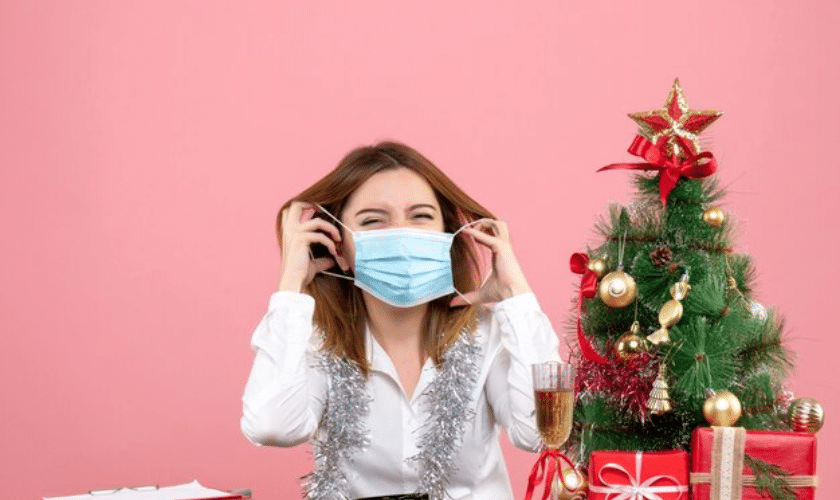Welcome to the joyous and festive Christmas season! Amidst the merriment, decorations, and joyful gatherings, many of us contend with a less joyous aspect: seasonal allergies. As snowflakes adorn the landscape and the aroma of pine fills the air, allergens like dust, mold, and even Christmas trees can trigger unpleasant symptoms. But fear not! This comprehensive guide is here to ensure you savor every moment of this magical time while managing your seasonal allergies effectively.
Understanding Seasonal Allergies
Seasonal allergens that are common during particular seasons cause immune system reactions known as allergic rhinitis or seasonal allergies. During the Christmas season, these allergens often include mold spores from Christmas trees or decorations, dust mites on stored ornaments, and even food allergies linked to traditional holiday dishes. The body’s immune system reacts to these substances, releasing chemicals like histamine, leading to symptoms such as sneezing, congestion, itchy or watery eyes, and, in severe cases, skin reactions or breathing difficulties.
Identifying Christmas Allergy Triggers
Recognizing the culprits behind your seasonal allergies is essential for effective management. For instance, live Christmas trees, though charming, may harbor mold spores. Artificial trees may gather dust during storage. Decorations, especially those stored in attics or basements, may have collected dust, mold, or even pet dander. Additionally, certain festive foods—nuts, dairy products, spices, and food preservatives—might trigger allergic reactions in sensitive individuals.
Tips for Managing Allergies at Home
Christmas tree care: To get rid of mold spores, consider hosing down your live tree if you are going to use one. Take it inside only after it has dried thoroughly. Artificial trees should be cleaned before assembly to remove any dust or allergens accumulated while stored.
Decoration Precautions: Wipe down or wash decorations before displaying them to remove dust and potential allergens. Use a mask or gloves while handling to avoid direct contact with and inhalation of irritants.
Indoor Air Quality: Regularly vacuum and dust indoor surfaces, including carpets, rugs, and upholstery. Using high-efficiency particulate air (HEPA) filters in vacuum cleaners and air purifiers can effectively reduce airborne allergens.
Coping Strategies for Outdoor Allergies
Check Pollen Counts: Monitor local pollen counts, usually available through weather forecasts or allergy websites. Plan outdoor activities during times of lower pollen levels, like after rain or in colder weather.
Protective Measures: Consider wearing wraparound sunglasses to shield your eyes from pollen. Using a mask when doing outdoor chores or activities can limit the inhalation of allergens.
Handling Food Allergies During Celebrations
Communicate Dietary Needs: Inform hosts about your food allergies in advance. Offer to bring a dish you can safely eat to ensure there’s an option available for you.
Reading Labels: Read food labels carefully, checking for allergens like nuts, dairy, gluten, or other potential triggers present in holiday treats.
Over-the-counter remedies and Medications
Explore over-the-counter antihistamines, decongestants, or nasal sprays to alleviate symptoms. Antihistamines help control sneezing, itching, and runny noses, while decongestants reduce nasal congestion. Nasal sprays can offer relief from inflammation. However, consult a healthcare professional before starting any new medication, especially if you have existing medical conditions or are taking other medications.
Natural Remedies and Lifestyle Changes
Natural remedies like saline nasal rinses can help cleanse the nasal passages, reducing congestion. Steam inhalation with essential oils, such as eucalyptus or peppermint, provides relief. Moreover, maintaining a healthy lifestyle—eating well, exercising regularly, and staying hydrated—strengthens the immune system, potentially reducing the severity of allergic reactions.
Seeking Professional Help
Persistent or severe symptoms warrant professional evaluation. Allergists can perform tests to pinpoint specific allergens causing your reactions. They can then suggest personalized treatment plans, which might include allergy shots (immunotherapy), prescription medications, or other interventions to manage your allergies better.
Navigating seasonal allergies during the Christmas season doesn’t have to dampen your festive spirit. By implementing these proactive strategies and being mindful of potential triggers, you can revel in the joys of the holiday season with minimal allergy-related disruptions. Remember, prioritizing your health allows you to immerse yourself fully in the magic of Christmas. Contact us to gain personalized insights and ensure a joyful, allergy-free celebration!


